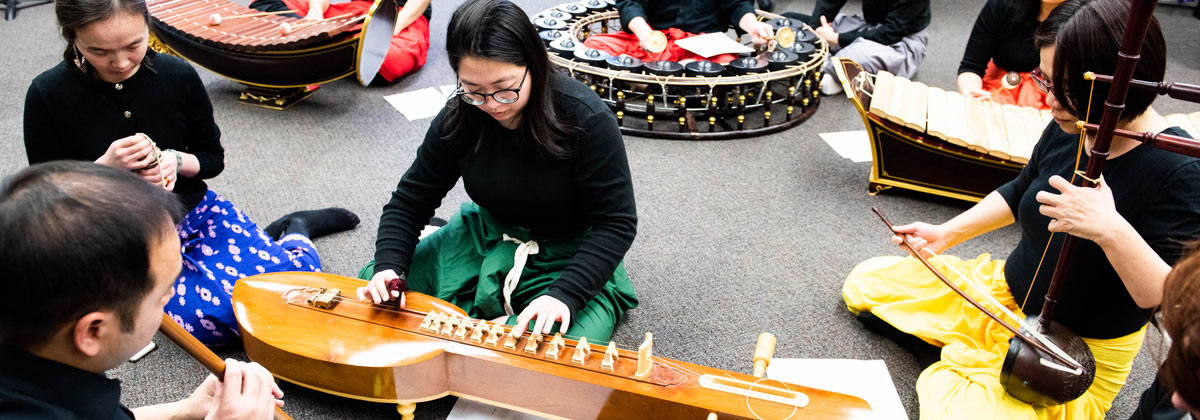- School of Music
- Programs
- Areas
- World Music

World Music
The NIU School of Music has been a leader in the integration of diverse musical cultures into the study of music. In the 1970s, NIU established the first all-student steelband and Chinese music ensemble in the U.S.
Over the years, we’ve built a unique curriculum of ethnomusicology, regional studies and performance studies. Our world music program will help you acquire high-level music skills while increasing your awareness of the cultural and social aspects of musical practices.
Many distinguished faculty members are affiliated with our world music program. The program also welcomes guest artists from around the world to give performances, lead workshops and direct world music ensembles.
These guest artists include:
- Yung-Hsin Chen for Chinese Music Ensemble
- I Gusti Ngurah Kertayuda for Gamelan Ensemble (Balinese)
- Omar al Musfi, Issam Rafea, and Issa Bolous for the Middle Eastern Music Ensemble.
Most recently, Chamni Sripraram directs the Thai Music Ensemble; Alex Yoffe, the Gamelan Ensemble; and Chinese music specialist, Yang Wei, directs the Chinese Music Ensemble.
While NIU doesn’t offer a bachelor’s degree in world music, you can take many world music courses as an undergraduate student. Possible career paths include pursuit of higher education in advanced study in ethnomusicology or music education, instructor at a community college, K-12 music educator, recording artist, songwriter and freelance/touring musician.
Graduate Study in World Music
You can obtain a Master of Music degree at NIU with an individualized study specialization in world music. You’ll work with a faculty advisor to design an area of specialization with coursework selected from offerings in the School of Music and other areas. Prior collaborative areas have included anthropology, art history, communication, foreign language, political science, history and the Center for Southeast Asian Studies.
In addition to completing the graduate music core curriculum, you can complete one of three world music tracks.
In this track, you’ll gain extensive performance experience by studying world music instruments, participating in world music ensembles and/or directing your own ensemble. In addition to studying your primary instrument, you’ll be encouraged to study unfamiliar instruments. You’ll also be encouraged to take non-European music courses and create projects that fuse diverse musical elements and concepts.
This track combines pedagogical trends in music education and world music. The coursework is framed within multiculturalism and globalism, due to their strong influence on pedagogical practices all over the world. You’ll study your primary non-European instrument and participate in world music ensembles. You’ll also reflect on the rationale, strategies and benefits of incorporating world music into the K-12 and college curricula.
This track will prepare you for doctoral study in ethnomusicology. You’ll take courses in world music and areas such as anthropology, art history, cultural studies, communication, history and political science. You’ll also participate in world music ensembles. At the end of the program, you’ll conduct ethnomusicological research and write a publishable manuscript (20-30 pages) or a thesis (100-150 pages).
If you have any questions about the world music program, please contact Jui-Ching Wang at jcwang@niu.edu or 815-753-7979.
- Areas of Study and Studios
Contact Us
Music Building
Monday - Friday
8 a.m. - noon
1 - 4:30 p.m.
815-753-1551
music@niu.edu
Austyn V. Menk
Music Admissions Coordinator
815-753-6306
avmenk@niu.edu